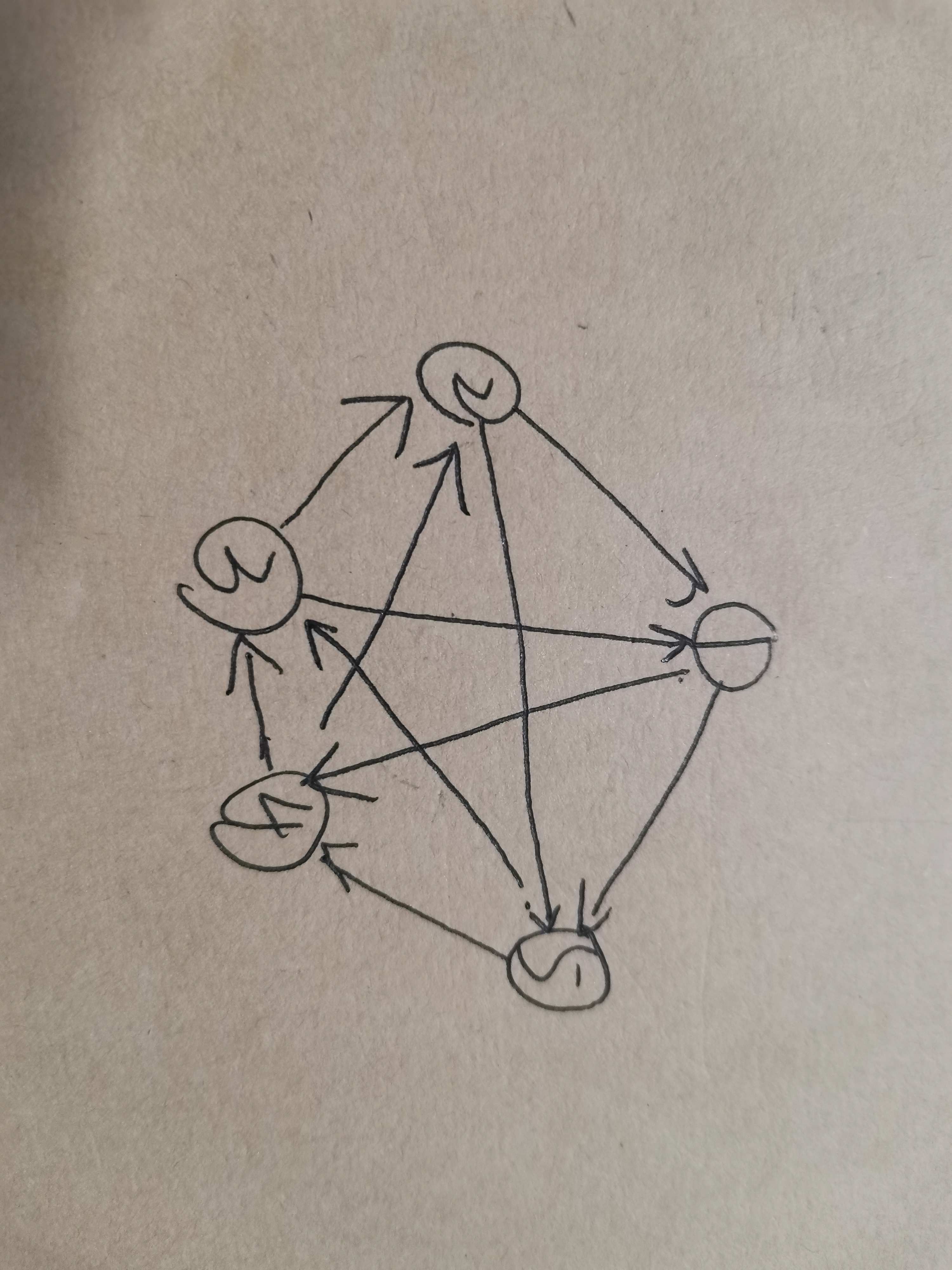Educational Codeforces Round 104 (Rated for Div. 2) A~E题解
写在前边
A. Arena
链接:A题链接
题目大意:
给定一个长度为的数组,表示个英雄的初始积分,任意选两英雄作战,积分高的获胜,同时积分高的那个积分还会增加,问有多少个英雄可以获胜。
思路:
明显,最低分的那个英雄永无出头之日,所以只需要排个序,让其他英雄与最低分的英雄作战即可。
代码:
#include <iostream>
#include <cstring>
#include <algorithm>
#include <cstdio>
#include <vector>
#include <map>
#include <cstring>
using namespace std;
#define Inf 0x3f3f3f3f
#define PII pair<int, int>
#define P2LL pair<long long, long long>
#define endl '\n'
typedef long long LL;
typedef unsigned long long ULL;
typedef vector<long long> VLL;
typedef vector<int> VI;
LL gcd(LL a, LL b) {
return b ? gcd(b, a % b) : a;
}
const int N = 110;
int a[N];
void solve() {
int n;
cin >> n;
for (int i = 0; i < n; i++) cin >> a[i];
sort(a, a + n);
int res = 0;
for (int i = n - 1; i >= 1; i--) {
if (a[i] > a[0]) res++;
}
cout << res << endl;
}
int main()
{
//ios::sync_with_stdio(false), cin.tie(nullptr), cout.tie(nullptr);
int t;
scanf("%d", &t);
while (t--) {
solve();
}
return 0;
}
B. Cat Cycle
链接:B题链接
题目大意:
一只大猫一只小猫不停的换位置睡觉,大猫的睡觉位置变化为,小猫的睡觉位置变化为,小猫不能和大猫睡到一起,一旦遇见小猫必须跳过当前位置到下一个位置,即如果在遇到大猫,那么应该立即跳到,求在两者各自移动个位置后小猫在哪个位置。
思路:
可以看成两只猫背靠背朝反方向移动,如果是偶数,那么两者永远不会相遇,如果是奇数,那么很神奇的是每步两者就会相遇,那么小猫需要跳一步,更神奇的是这时两者又背靠背挨着了,向反方向移动,即小猫恰好在大猫后一个数,换句话说,就是说小猫每就会多跳一步那么令为一个周期,那么小猫就多跳了步,所以它处于的位置就是
那么把两种情况融合就是:
还有一个细节就是,上面公式只适合从开始索引,如果像本题这样从开始索引,那么可以先让减,然后后再加,看下面代码。
代码:
#include <iostream>
#include <cstring>
#include <algorithm>
#include <cstdio>
#include <vector>
#include <map>
#include <cstring>
using namespace std;
#define Inf 0x3f3f3f3f
#define PII pair<int, int>
#define P2LL pair<long long, long long>
#define endl '\n'
typedef long long LL;
typedef unsigned long long ULL;
typedef vector<long long> VLL;
typedef vector<int> VI;
LL gcd(LL a, LL b) {
return b ? gcd(b, a % b) : a;
}
void solve() {
int n, k;
scanf("%d%d", &n, &k);
k--;
if (n % 2 == 0) {
printf("%d\n", k % n + 1);
return;
}
int t = n / 2; //一个周期
printf("%d\n", (k + k / t) % n + 1);
}
int main()
{
//ios::sync_with_stdio(false), cin.tie(nullptr), cout.tie(nullptr);
int t;
scanf("%d", &t);
while (t--) {
solve();
}
return 0;
}
C. Minimum Ties
链接:C题链接
题目大意:
有n支队伍,要进行场比赛,即比如有3支队伍,有-,-,-三场比赛,胜者得分,平局各得分,败者不得分,现在要求我们通过让他们之间进行最少的平局使得所有队伍获得相同的分数。
思路:
首先明白,如果没有平局得情况下,那么所有队伍得分和为,那么对于有奇数支队伍的时候,可以被整除,所以对于奇数支来说,就让他们输赢对半分即可,把它们看成一个图上的几个点,当前队伍赢得它前边支队伍,输给其他队伍,那么这样就构成了一个欧拉图(明天补),假如有五支队伍,一个点的出边所连的点表示他干掉的队伍,指向它的点表示干掉它的队伍,那么构造答案即可。

对于为偶数情况下,是不能这样搞的,因为会发现无法被整除,所以我们可以通过让它们之间产生平局来使被整除,假设产生个平局,一个平局则让总分减少1,那么要使得被整除,可得,因为,注意这里加再取模是为了让余数得到正数(刚学到的技巧),同时只有为偶数时这种情况下的公式才可以成立,不然得到就意味着我们需要给总分加分,显然不合理。这样之后我们就知道,需要进行场平局,那么还是可以看成一个图,让每个队伍战胜它前边第支队伍前的队伍,输掉它后边第支队伍后的队伍,对于恰好它前边恰好第支队伍打成平局,那么这样平局恰好是场。
构造答案即可。
代码:
#include <iostream>
#include <cstring>
#include <algorithm>
#include <cstdio>
#include <vector>
#include <map>
#include <cstring>
using namespace std;
#define Inf 0x3f3f3f3f
#define PII pair<int, int>
#define P2LL pair<long long, long long>
#define endl '\n'
typedef long long LL;
typedef unsigned long long ULL;
typedef vector<long long> VLL;
typedef vector<int> VI;
LL gcd(LL a, LL b) {
return b ? gcd(b, a % b) : a;
}
void solve() {
int n;
cin >> n;
if (n % 2 == 1) {
for (int i = 0; i < n; i++) {
for (int j = i + 1; j < n; j++) {
if (j - i <= n / 2) {
cout << 1 << " ";
} else {
cout << -1 << " ";
}
}
}
puts("");
} else {
for (int i = 0; i < n; i++) {
for (int j = i + 1; j < n; j++) {
if (j - i < n / 2) {
cout << 1 << " ";
} else if (j - i == n / 2) {
cout << 0 << " ";
} else {
cout << -1 << " ";
}
}
}
puts("");
}
}
int main()
{
//ios::sync_with_stdio(false), cin.tie(nullptr), cout.tie(nullptr);
int t;
scanf("%d", &t);
while (t--) {
solve();
}
return 0;
}
D. Pythagorean Triples
链接:D题链接
题目大意:
找出一个三元组,使得满足与。
思路:
推公式,两方程联立得:,那么可得,那么带入得到。那么可以看出,有唯一对应唯一的奇数,那么我们就枚举所有的即可,同时要求,即要求,那么,最多就到即可。复杂度约为
代码:
#include <iostream>
#include <cstring>
#include <algorithm>
#include <cstdio>
#include <vector>
#include <map>
#include <cstring>
using namespace std;
#define Inf 0x3f3f3f3f
#define PII pair<int, int>
#define P2LL pair<long long, long long>
#define endl '\n'
typedef long long LL;
typedef unsigned long long ULL;
typedef vector<long long> VLL;
typedef vector<int> VI;
LL gcd(LL a, LL b) {
return b ? gcd(b, a % b) : a;
}
void solve() {
int res = 0, n;
scanf("%d", &n);
for (int i = 3; i * i <= 2 * n - 1; i += 2) res++;
printf("%d\n", res);
}
int main()
{
//ios::sync_with_stdio(false), cin.tie(nullptr), cout.tie(nullptr);
int t;
scanf("%d", &t);
while (t--) {
solve();
}
return 0;
}
E. Cheap Dinner
链接:E题链接
题目大意:
有四类菜,每类菜又有多种,给定它们的价格,同时在第一类与第二类,第二类与第三类,第三类与第四类之间还存在冲突,我们从四类菜种各选一类菜,要求它们之间不能有冲突,并且我们花费的价格最小。
思路:
本质就是数字三角形吧,不过不一样的是这题加了一下限制。
用表示走到第类菜的第道菜获得的最小代价,所以得到方程就是:
而我们要快速得到最优的,肯定不能用枚举的方式,可以用来存所用到的每一类菜价格,同时记录关联,有关联的菜品会先从中删除,由于会自动排序,那么中剩余的第一个元素就是我们所需要的。
代码:
#include <iostream>
#include <cstring>
#include <algorithm>
#include <cstdio>
#include <vector>
#include <map>
#include <cstring>
//#pragma GCC optimize(2)
//#pragma GCC optimize(3,"Ofast","inline")
using namespace std;
#define Inf 0x3f3f3f3f
#define PII pair<int, int>
#define P2LL pair<long long, long long>
#define endl '\n'
typedef long long LL;
typedef unsigned long long ULL;
typedef vector<long long> VLL;
typedef vector<int> VI;
const int Mod = 10000007;
LL gcd(LL a, LL b) {
return b ? gcd(b, a % b) : a;
}
const int N = 150010;
const int INF = 1e9;
int n[5];
int dish[5][N];
vector<int> relation[5][N];
void solve() {
for (int i = 1; i <= 4; i++) scanf("%d", &n[i]);
for (int i = 1; i <= 4; i++) {
for (int j = 1; j <= n[i]; j++) {
scanf("%d", &dish[i][j]);
}
}
int m;
for (int i = 2; i <= 4; i++) {
scanf("%d", &m);
for (int j = 1; j <= m; j++) {
int v1, v2;
scanf("%d%d", &v1, &v2);
relation[i][v2].push_back(v1); //后一类的第v2道菜与前一类的第v1道有关联
}
}
for (int i = 2; i <= 4; i++) { //从第二类菜开始处理
map<int, int> st; //map有自动排序功能
for (int j = 1; j <= n[i - 1]; j++) st[dish[i - 1][j]]++; //预处理前一类菜的价格
for (int j = 1; j <= n[i]; j++) {
for (auto &k : relation[i][j]) {
st[dish[i - 1][k]]--; //删去有关联的
if (!st[dish[i - 1][k]]) st.erase(dish[i - 1][k]);
}
if (st.size()) dish[i][j] += st.begin()->first;
else dish[i][j] = INF;
for (auto &k : relation[i][j]) st[dish[i - 1][k]]++; //恢复
}
}
int res = INF;
for (int i = 1; i <= n[4]; i++) {
res = min(res, dish[4][i]);
}
if (res == INF) puts("-1");
else printf("%d\n", res);
}
int main()
{
//ios::sync_with_stdio(false), cin.tie(nullptr), cout.tie(nullptr);
solve();
return 0;
}



【推荐】国内首个AI IDE,深度理解中文开发场景,立即下载体验Trae
【推荐】编程新体验,更懂你的AI,立即体验豆包MarsCode编程助手
【推荐】抖音旗下AI助手豆包,你的智能百科全书,全免费不限次数
【推荐】轻量又高性能的 SSH 工具 IShell:AI 加持,快人一步
· AI与.NET技术实操系列:基于图像分类模型对图像进行分类
· go语言实现终端里的倒计时
· 如何编写易于单元测试的代码
· 10年+ .NET Coder 心语,封装的思维:从隐藏、稳定开始理解其本质意义
· .NET Core 中如何实现缓存的预热?
· 25岁的心里话
· 闲置电脑爆改个人服务器(超详细) #公网映射 #Vmware虚拟网络编辑器
· 零经验选手,Compose 一天开发一款小游戏!
· 因为Apifox不支持离线,我果断选择了Apipost!
· 通过 API 将Deepseek响应流式内容输出到前端